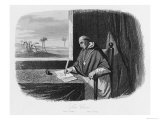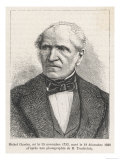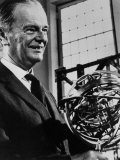|
|
|
Thomas Cahill
b. 1940; NYC, NY
Historian, author, and professor Thomas Cahill is best known for The Hinges of History series which includes How the Irish Saved Civilization, The Gifts of the Jews, Desire of the Everlasting Hills, Sailing the Wine Dark Sea, and Mysteries of the Middle Ages.
|
|
|
|
Joseph Campbell
b. 3-26-1904; White Plains, New York
d. 10-30-1987; Hawaii
Joseph Campbell, who could be considered a cultural historian, psychologist and anthropologist, is best known for his studies in comparative mythology and religion.
“Wherever the poetry of myth is interpreted as biography, history, or science, it is killed. The living images become only remote facts of a distant time or sky. Furthermore, it is never difficult to demonstrate that as science and history mythology is absurd. When a civilization begins to reinterpret its mythology in this way, the life goes out of it, temples become museums, and the link between the two perspectives becomes dissolved.”
|
|
|
|
|
|
|
Michel Chasles
b. 11-15-1793; Épernon, France
d. 12-18-1880; Paris
Michel Chasles was an historian of mathematics, mathematician and professor of mathematics. His first major work was “Historical view of the origin and development of methods in geometry”; he also worked on projective geometry, quadric surfaces and conic sections.
|
|
|
|
Winston Churchill
b. 11-30-1874; Blenheim Palace
d. 1-24-1965
Winston Churchill was a noted historian, artist and writer in addition to being better known as a British statesman and orator. His two most popular works were The Second World War and A History of the English-Speaking Peoples. Churchill was awarded the 1953 Nobel Prize in Literature “for his mastery of historical and biographical description as well as for brilliant oratory in defending exalted human values.”
Winston Churchill quotes ~
• “Never give in, never give in, never; never; never; never - in nothing, great or small, large or petty - never give in except to convictions of honor and good sense.”
• “I have nothing to offer but blood, toil, tears and sweat.” May, 1940
• “But if we fail, then the whole world, including the United States, including all that we have known and cared for, will sink into the abyss of a new dark age made more sinister, and perhaps more protracted, by the lights of perverted science. Let us therefore brace ourselves to our duties, and so bear ourselves, that if the British Empire and its Commonwealth last for a thousand years, men will still say, This was their finest hour.” June, 1940
• “Never in the field of human conflict was so much owed by so many to so few.” August, 1940
• “A fanatic is one who can't change his mind and won't change the subject.”
• “A pessimist sees the difficulty in every opportunity; an optimist sees the opportunity in every difficulty.”
• “Eating words has never given me indigestion.”
• “Healthy citizens are the greatest asset any country can have.”
• “I am easily satisfied with the very best.”
• “This is the type of arrant pedantry up with which I will not put.” (attributed)
|
|
|
|
Kenneth McKenzie Clark
b. 7-13-1903; London, England
d. 5-21-1983
Art historian, broadcaster and museum director wrote the BBC Telelvision series, Civilisation.
FYI - Kenneth Clark's family wealth came from manufacturing textiles - as in Coats & Clark. Clark was also a friend of Edith Wharton.
Kenneth Clark quotes ~
• “I cannot distinguish between thought and feeling, and I am convinced that a combination of words and music, colour and movement can extend human experience in a way that words alone cannot do. For this reason I believe in television as a medium, ...”
• “Lives devoted to Beauty seldom end well.”
• “The great artist takes what he needs.”
• “Opera, next to Gothic architecture, is one of the strangest inventions of Western man. It could not have been foreseen by any logical process.”
• “The stabilising, comprehensive religions of the world, the religions which penetrate to every part of a man's being--in Egypt, India or China--gave the female principle of creation at least as much importance as the male, and wouldn't have taken seriously a philosophy that failed to include them both...It's a curious fact that the all-male religions have produced no religious imagery--in most cases have positively forbidden it. The great religious art of the world is deeply involved with the female principle.”
• “It is lack of confidence, more than anything else, that kills a civilisation. We can destroy ourselves by cynicism and disillusion, just as effectively as by bombs.”
|
|
|
|
R. G. Collingwood
b. 2-22-1889; Cartmel, Lancashire, England
d. 1-9-1943: Lancashire Robin George Collingwood, historian, archaeologist, and philosopher, is the author of The Idea of History and The Principles of Art, often cited works.
FYI ~ W.F. Collingwood, father of R. G., was an assistant to art historian John Ruskin, and author Arthur Ransome was a family friend.
|
|
|
|
|
|
|
|
|
|
previous page | top | next
Notable Historians List | a | b | C | d-e | f | g | h | i-j-k | l | m-o | p | r | s | t | u-v | w | x-y-z
|
|
I have searched the web for visual, text, and manipulative curriculum support materials - teaching posters, art prints, maps, charts, calendars, books and educational toys featuring famous people, places and events - to help teachers optimize their valuable time and budget.
Browsing the subject areas at NetPosterWorks.com is a learning experience where educators can plan context rich environments while comparing prices, special discounts, framing options and shipping from educational resources.
Thank you for starting your search for inspirational, motivational, and educational posters and learning materials at NetPosterWorks.com. If you need help please contact us.
|
|
| last updated 1/3/14 |
|















